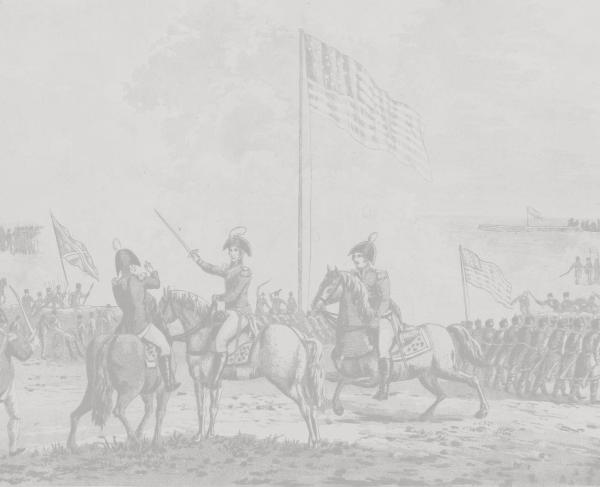War of 1812: "This Treaty was Generally Satisfactory"

At the conclusion of his history book about the War of 1812, William McCarty included these observations on the responses in Britain and the United States to the war-ending Treaty of Ghent. The book was published in 1817, in the near-aftermath of the conflict and without long-range hindsight.
. . . . A treaty of peace was agreed upon by the commissioners of the two nations at Ghent. After a tedious procrastination on the part of the British government, the negociation was commenced by the British commissioners bringing forward demands which could only have been acceded to by a degraded and conquered people, one of which was declared to be a sine qua non ; and that, after finding that the only effect produced by these demands was the union of the whole American people to resist them, they were all withdrawn, and a treaty agreed on, simply placing the political rights and territories of the two nations on the same footing as previous to the war. It was signed at Ghent on the 24th of December, and soon after ratified by the prince regent. It received its final ratification by the president on the 18th of February, 1815
This treaty was generally satisfactory to the American people, for, though it left the great questions of impressment and illegal blockades unsettled, it was believed, that the respect which the victories of the navy had inspired toward the American flag, would prevent a repetition of those outrages which preceded the war. The mighty changes which had taken place in Europe were believed to have the same tendency, by removing many of the pretexts on which these outrages were founded.
But although the peace with America was also a general subject of joy in Great Britain, much dissatisfaction was excited on the publication of the terms. The treaty formed, indeed, a deplorable contrast with the high-sounding threats and boasts of the ministry but a few months before; and after the demands which had been brought forward, it was conceived that it consummated the humiliation of the British ministry.*
*The public stocks experienced a considerable depression on the publication of the treaty, it being conceived, that nothing but the probability of a new war in Europe could have occasioned the disgraceful compromise, as the treaty was called by the government papers.
On an addressing being moved in the house of commons congratulating the prince regent on the re-establishment of peace, an amendment was moved, which, though it was not carried, shows in a striking manner the sentiments of a great part of the nation. The amendment proposed that the following should be substituted for the original address.
"To assure his royal highness that we contemplate with great satisfaction the restoration of a state of peace and amity between his majesty and the United States of North America; but we should deem ourselves highly deficient in the discharge of our duty towards his majesty and his people, were we not to express to his royal highness our deepest regret, that a measure so necessary to the welfare and prosperity of his majesty's dominions, was not sooner accomplished; that in reviewing the terms of the treaty which his royal highness has been graciously pleased to lay before us, we are at a loss to discover what were the causes which so long retarded its conclusion; that, in our opinion, the honour of his majesty's crown, and the interest of his people, both required that as soon as the peace of Europe had been established by the treaty signed at Paris, on the 8th day of May, in the last year, the speediest and most effectual measures should have been adopted for the negociation of a treaty of peace with the United States of North America; that the complete and entire cessation of hostilities in Europe had removed or suspended the operation of the causes, which had occasioned or accompanied the late war between his majesty and the United States; that the elevated and commanding station which the united kingdom then held amongst the nations of the world would have rendered the manifestation of a sincere wish for the restoration of the blessings of peace with the United States highly honourable to his majesty's counsels; and would have afforded the government and people of America the most unequivocal proofs of the generousity and magnanimity of the British nation; of a sincere desire to bury in lasting oblivion the recollection of that hostility which then unhappily subsisted, and of its anxious wish for the re-establishment of peace upon terms honourable and advantageous to both countries, and likely to insure its own permanency by the justice and liberality of its conditions; that we are the more deeply afflicted by the long and (as we deem it) unnecessary delay in the conclusion of peace, when we reflect upon the great and incomparable injury his majesty and his people have sustained, by the unnecessary and unprofitable waste of treasure, by the loss of so many distinguished and heroic officers, and of such numbers of brave, loyal, and experienced troops; and we most deeply lament that these calamities should be aggravated by mortifying reflections, that the fame of the British arms may appear to be diminished by the failure of the latest military enterprizes of the war. That affords us, however, consolation to find, that peace is at length re-established; and to assure his royal highness, that it is the earnest wish and desire of this house to cultivate and maintain the most cordial and intimate union with the government and people of the United States
"That we rely upon his royal highness' wisdom and goodness to cherish and preserve the most friendly relations between them and his majesty's subjects; and we confidently trust, that a corresponding disposition in the government and the people of the United States, will enable his royal highness to continue unimpaired, and undisturbed, the harmony now so happily restored between them; and that the two freest nations in the world may exhibit to mankind the grateful spectacle of mutual confidence and lasting peace."
The experience of the war has taught us [Americans] many useful lessons, which it is to be hoped our statesmen will not suffer to pass without profit. We have learnt that a large and efficient revenue, not vulnerable from abroad, is essential to its successful conduct; and that a dependence on loans for the extra expenses of war is fatal and ruinous.
We have learnt that a navy is not only the best and cheapest, but the only effectual defence against the invasion of a coast so extensive as that of the United States; that a navy is peculiarly suited to the genius of our country; and, that, as it cannot possibly endanger our republican institutions, its size ought to keep pace with our means of supporting it.
We have also seen the advantages and defects of our military system; and the necessity that exists for more clearly determining the powers of the general government on this and other important questions. It is to be hoped that the present period of unexampled harmony will not be suffered to pass unimproved.*
*By the articles of confederacy, the states appointed regimental officers, the general government the field and general officers. Is there any solid objections to this plan?
Source:
History of the War of 1812, From the Commencement, until the Final Termination Thereof, on the Memorable Eighth of January, 1815, at New Orleans, Third Edition, by William McCarty, 1817. Accessed through Library of Congress. (Pages 250-252)

